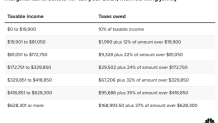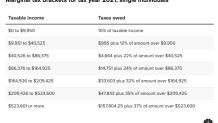
- If you’re banking on a tax refund, it may be smaller, or you may owe money this season, according to financial experts.
- The advance child tax credit, paused student loan payments and year-end mutual fund payouts may cause higher taxable income for 2021.
If you're banking on a tax refund, it may be smaller, or you may owe money this season, according to financial experts.
Typically, you get a federal tax refund when you've paid or withheld more than the amount you owe, based on taxable income.
The IRS subtracts the greater of the standard or itemized deductions from adjusted gross income to reach taxable income, and there are a few reasons why it may be higher in 2021.
Get a weekly recap of the latest San Francisco Bay Area housing news. Sign up for NBC Bay Area’s Housing Deconstructed newsletter.


Advance child tax credit payments
Money Report
The American Rescue Plan, signed by President Joe Biden in March, boosted the 2021 child tax credit to $3,000 from $2,000 per child age 17 and under, with an extra $600 for children under age 6.
Millions of families received half up front, through $250 or $300 monthly payments, from July through December, meaning they will have a smaller write-off at tax time.
"Working families are not expecting this," said Tommy Lucus, a certified financial planner and enrolled agent at Moisand Fitzgerald Tamayo in Orlando, Florida. "And it's going to be a shock to them."
For example, if you qualified for a $3,000 tax credit and received payments for $1,500 in advance, you will claim the $1,500 balance when filing a tax return.
That's $500 less than the $2,000 credit received the previous year, assuming you have the same income, he explained, and it may be worse with multiple children.
"It could be the difference between someone getting a small refund and owing a lot," Lucus said.
Moreover, you may have to return part of the advance tax credit if 2021 adjusted gross income exceeds certain limits.
The phase-out begins for single parents over $75,000 or joint filers above $150,000. Families lose eligibility for the enhanced tax credit amounts over $95,000 for single filers and $170,000 for married couples filing together.
Paused student loan payments
In March 2020, the U.S. Department of Education gave millions of Americans the option to pause monthly student loan payments, and nearly 90% of borrowers have accepted.
While the break offered relief through 2021, there's a trade-off at tax time: no write-off for student loan interest.
Typically, borrowers may deduct up to $2,500 of interest, depending on how much they paid, and it's an "above-the-line" tax break, reducing gross income, even without itemizing deductions.
It could be $500 or $600 at the end of the day, in real money, after that adjustment
Patrick Amey
ADVISOR AT FINANCIAL ADVISORY SERVICE, INC.
The $2,500 benefit starts to phase out in 2021 with modified adjusted gross income over $70,000 for single filers and $140,000 for joint returns.
Single borrowers above $85,000 or couples filing together over $170,000 aren't eligible.
It's significant for lower to middle-income filers making student loan payments, said Patrick Amey, a CFP and advisor at Financial Advisory Service in Overland Park, Kansas.
"It could be $500 or $600 at the end of the day, in real money, after that adjustment," he said.
Mutual fund distributions
Mutual fund investors may also see a bigger 2021 tax bill due to higher year-end payouts.
"I think sometimes capital gains distributions in taxable accounts are a surprise to investors," said Clark Randall, a Dallas-based CFP and founder of Financial Enlightenment.
Many actively managed mutual funds had a strong year, spitting out high single- or double-digit payouts in December, triggering extra taxes in brokerage accounts.
While the levies may add to 2021 liability, the gains also increase the mutual fund's basis, or original purchase price, reducing future bills.
"Obviously, none of us want to pay taxes," said Randall. "But paying a little along the way isn't necessarily bad."






